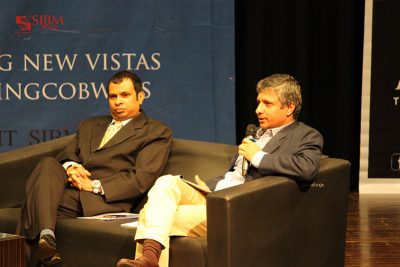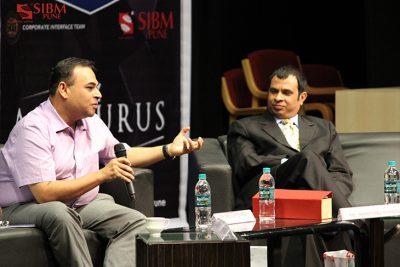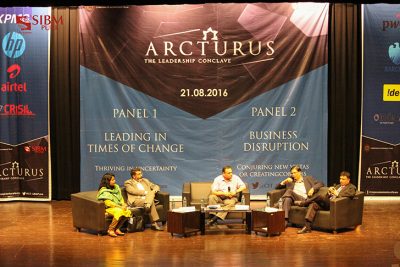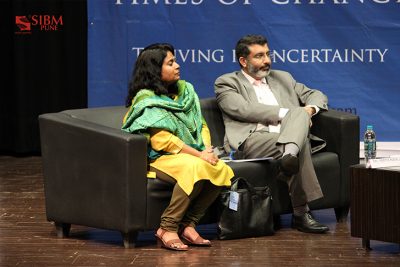Mr. Roy asked the panel about whether it was difficult to become a leader, especially in today’s world. Mr. Pande agreed on the fact that times are indeed changing—things are happening way faster now than they happened a decade ago. But that does not mean there would not be any leaders—on the contrary, such times invite people to take up the mantle of leadership. Mr. Rattan added up that though the times are changing fast, the old and the new need to accept each other and find the right balance. In his words, “Perseverance, right attitude and the right aptitude are the qualities that a leader requires.”

Mr. Iyer, in response to the question as to what special thing a leader has, in turn asked the audience on its view whether leaders are born or made. With a clear majority towards the latter, he stated though leaders tend to have some inborn qualities of intelligence and extraversion, unless a leader has a purpose and in turn people who trust in him, he cannot be a leader.

In Mr. Bhamare’s words, leadership has many types but has one thing in common—effective communication. And this is tested when an organization faces a crisis. The way crisis is handled determines the level of smoothness and fluency of communication in the organization.
After the panel opened up for questions from the audience, many students asked questions pertinent to the changes the world in undergoing today, as exemplified by Arka Mascharak, MBA-1, Marketing—“While automation is a big topic, and India being a hub of IT, will it result in people losing their jobs?” The collective consensus of the panel was on lines of the fact that though in the short term it would seem that people are losing jobs, actually the fact is that manpower will diverted to more productive avenues and hence there will be net growth both in the macro and micro levels.
The second panel’s topic was “Business Disruption” and the panelists were Mr. Rakesh Kaul, Partner, PWC; Ms. Smita Nair Jain, COO, Barclays; Mr. Chetan Gangoli, AVP and Marketing Head, Idea and Mr. Yogesh Mariwalla, CEO, Index Advisory. The moderator of the second panel was Mr. Prodipto Roy.

Mr. Roy began by stating that disruption as a word tends to give off a negative vibe. Mr. Kaul added that though many see the government as a disruptor, it is actually a facilitator and disruption follows. Disruption is responsible for the transformation of the market which ends up creating net growth. Mr. Gangoli agreed with Mr. Kaul and said that though disruption seems to be the new “cool” in today’s world of business, it is actually something which is quite old. But it can be said that now that the pace of disruption has accelerated. Ms. Jain felt that the large companies have an advantage in such situations as they have the resources that can act as “shock absorbers”. She also stated that innovation and disruption are actually two different things—all disruptors are innovators but there are many innovations that have bypassed the route of disruption. She defined disruption as a “process of creating new markets by creating new categories”.
In response to the question as to when disruption happens, Mr. Mariwalla opined that it happens mostly when complacency sets in. Disruption boosts an organization, and especially large organizations which are not very agile.
The Q&A session that followed the discussion was stimulating as the topic resonated with the thoughts of many students. Vibhor Khattar from MBA-1 Finance asked the panel about whether Brexit would prove to be a disruption to which the panel replied that it has the potential to be as this phenomenon would result in changes from the very basic levels to the higher ones. From data privacy laws to basic environmental stands, everything would now need a review.

Arcturus 2016 ended on a high note with a vote of thanks by the Director, SIBM Pune and the audience carrying out with themselves the knowledge and experiences as shared on the dais. In the words of Simli Gharai from MBA-1 Human Resources, “The points were presented and explained with examples and anecdotes which cleared my doubts.” SIBM Pune was glad to host the panelists and would be delighted to welcome them again in the future.


















Comments